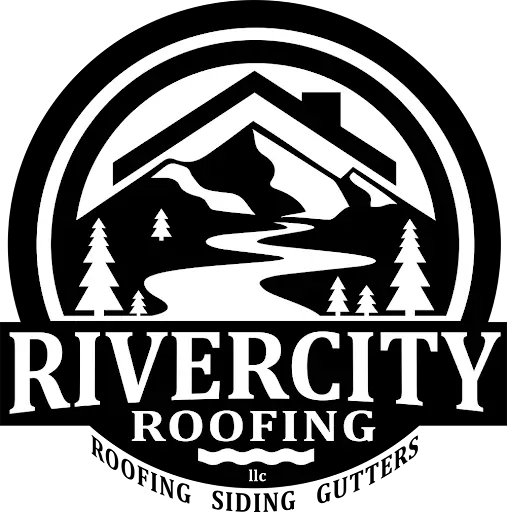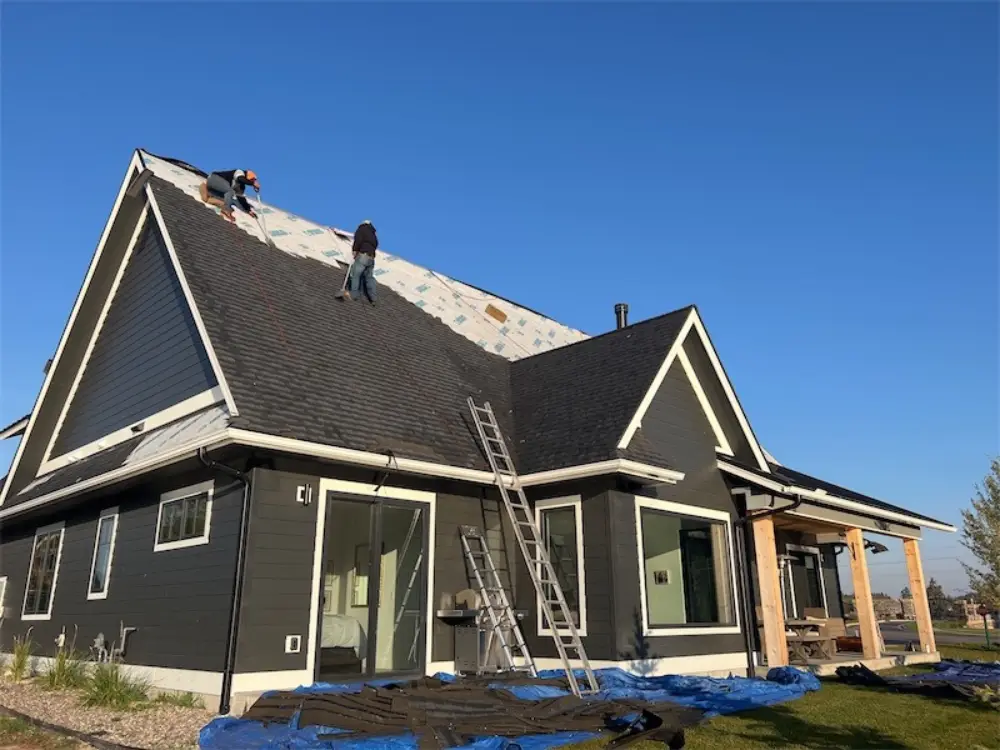Understanding “how much roof replacement costs” is pivotal for homeowners grappling with this significant decision. The cost of roof replacement can vary widely, influenced by materials, labor, the size of the roof, and various other factors. Whether due to wear and tear over time or sudden damage from a storm, the necessity for a roof replacement brings forth the importance of budgeting accurately for this critical home maintenance project. With the roof serving as a primary defense against the elements, ensuring a quality replacement is essential for the safety and longevity of your home.
This article will offer a detailed breakdown of the factors affecting roof replacement costs, including comparisons by material and roof size, other costs to consider, such as roof inspection, repair, and maintenance, and the average cost for roof replacement.
Factors Affecting the Cost of a Roof Replacement
Several key factors significantly influence the cost of roof replacement. Understanding these variables can help homeowners prepare financially for this substantial investment.
Size and Pitch of the Roof
The overall size of the roof is a primary determinant of replacement costs. Roofing materials are typically priced per square foot, and larger roofs require more materials and labor, thereby increasing the overall expense. Additionally, the pitch or slope of the roof plays a critical role. Steeper roofs demand additional safety measures and are more challenging to work on, which can elevate labor costs. For instance, roofs with a pitch over 6:12 are considered complex and may incur higher costs due to the need for specialized equipment and extended labor hours.
Type of Roofing Material
The choice of roofing material has a significant impact on the cost of roof replacement. Options range from affordable three-tab asphalt shingles to high-end materials like slate or metal. For example, architectural asphalt shingles offer a balance of affordability and durability, whereas materials like slate are more expensive but provide a longer lifespan and enhanced aesthetic appeal. Each material comes with different price points and longevity, influencing the overall cost and value of the roof replacement.
Geographic Location
The cost of roof replacement can also vary based on geographic location. Labor charges, the cost of materials, and even the competitive landscape among roofing contractors can differ significantly from one region to another. Urban areas typically feature higher labor rates compared to rural locations. Additionally, local climate conditions can affect the choice of materials and the complexity of the installation process, further influencing costs.
Complexity of Roof Design
Complex roof designs with features such as multiple levels, valleys, dormers, or skylights require more time and precision during installation, leading to higher costs. Each additional architectural feature adds complexity and requires more materials and labor. For instance, installing flashing around chimneys and integrating skylights necessitates meticulous workmanship, which can increase the overall expense.
By considering these factors, homeowners can better understand the financial implications of roof replacement and make informed decisions. For those considering such projects, it is advisable to consult with experienced roofing contractors who can provide detailed assessments and accurate cost estimates based on these variables.
For a comprehensive evaluation of your roof and a detailed cost estimate, consider scheduling a free roof inspection today.
Free Roof Inspections. Fast. Reliable.
Is your roof ready to weather the storm? Dont risk property damage. Our free roof inspections provide expert analysis to identify potential issues before they become costly problems.
Roof Replacement Cost by Material
Cost of Asphalt Shingles
Asphalt shingles are a popular choice due to their cost-effectiveness and ease of installation. The price for asphalt shingles ranges from $4.25 to $25 per square foot, which includes both materials and labor. Basic three-tab shingles, which are the most affordable, typically cost between $4.25 and $8.25 per square foot installed and can last up to 20 years. On the higher end, architectural asphalt shingles, known for their durability and aesthetic appeal, can cost up to $12.25 per square foot. For a standard 3,000-square-foot roof, homeowners might pay between $10,500 and $28,500, depending on the type and quality of the asphalt shingles selected.
Cost of Metal Roofing
Metal roofing is valued for its durability and energy efficiency, offering a lifespan that can exceed 50 years. Costs for metal roofing vary significantly based on the material type, ranging from $4 to $40 per square foot installed. Common materials include steel, aluminum, copper, and zinc. Steel roofs cost between $5 and $17 per square foot, while aluminum options range from $8 to $18 per square foot. Premium materials like copper can cost between $20 and $40 per square foot. The installation complexity and roof size also play crucial roles in the final cost.
Cost of Tile Roofing
Tile roofs are renowned for their longevity and distinctive style, with costs varying from $8,000 to $23,000 for typical installations. Per square foot, homeowners might spend $7 to $28, which includes $2 to $10 for materials and $5 to $18 for labor. The type of tile—whether clay, concrete, or slate—affects the price, with clay generally being more expensive due to its manufacturing process. Various styles, such as Spanish, French, and Riviera, can also influence the cost, with prices for these tiles ranging from $8 to $13 per square foot.
Cost of Slate Roofing
Slate roofing stands out for its exceptional durability and classic appearance, often lasting over 100 years. The cost for slate roofing can range widely, from $14,000 to $60,000 for a 2,000-square-foot roof, translating to about $7 to $30 per square foot. This includes both materials and labor, with natural slate being on the higher end of the price spectrum. Installation of a slate roof is complex and requires specialized skills, often leading to higher labor costs, which can range from $50 to $100 per hour. The roof’s structural support might also need reinforcement before installation, adding to the overall expense.
Breaking Down Costs by Roof Size
Cost for 1,000 Square Feet
For homeowners considering roof replacement, the costs can vary significantly depending on the size of the roof. A 1,000-square-foot roof typically costs between $4,700 and $10,000 to replace. This price range reflects various factors, including the choice of materials and the geographic location of the property.
Cost for 1,500 Square Feet
Replacing a roof of 1,500 square feet can cost between $7,125 and $15,000. The national average cost for this size using architectural shingles on a cross gable roof is approximately $10,500. Costs may increase if modifications such as reinforcing the roof deck are required, especially when using heavier materials like clay tiles.
Cost for 2,000 Square Feet
The cost to replace a 2,000-square-foot roof ranges from $9,500 to $20,000, with the average homeowner paying about $14,000 for architectural shingles on a cross-gable roof. Complex roof designs or the use of premium materials such as clay tiles can significantly increase the total expense, potentially reaching up to $60,000 if extensive modifications are needed.
Cost for 3,000 Square Feet
A 3,000-square-foot roof replacement costs between $14,250 and $30,000, with most homeowners spending around $21,000. This size roof is common in homes with features like cross-gables and large dormers. The choice of materials plays a significant role in the final cost, ranging from basic 3-tab shingles to high-end options like clay tiles or slate, which may require structural adjustments to support their weight.
Other Costs to Consider
When planning for a roof replacement, homeowners should be aware of additional costs that can significantly impact the overall budget. These include permit fees, removal and disposal expenses, and costs related to structural repairs.
Permit Fees & Inspection Costs
Obtaining the necessary permits is a crucial step in the roof replacement process, with costs ranging from $100 to $500. These fees vary depending on local regulations and the scope of the work. For extensive repairs or replacements, a roofing permit can cost between $150 to $500. It is essential to check with local authorities to ensure all required permits are acquired to avoid legal complications and potential fines.
Removal and Disposal Fees
The cost of removing and disposing of the old roofing materials can add to the overall expenses of roof replacement. Homeowners should expect to pay between $1 and $5 per square foot for roof tear-off. The price depends on the condition and complexity of the existing roof. Additionally, renting a dumpster for the disposal of old materials typically costs between $220 to $699 per week, depending on the size of the dumpster required.
Repair Costs for Structural Damage
Structural damage can vary widely in scope and cost. Simple repairs, such as patching small leaks, may cost between $150 to $1,000. More extensive structural repairs, like fixing a sagging roof or replacing damaged trusses, can range from $3,000 to $6,000. Costs for replacing other elements like roof decking, insulation, and underlayment can also accumulate, with prices ranging from $75 to $500 per 100 square feet for each component. Homeowners dealing with water damage or mold issues due to roof leaks might face additional costs for mold removal and water damage restoration, which can range from $1,500 to $15,000.
For homeowners considering roof replacement or repairs, it is advisable to consult with professional roofing contractors who can provide a detailed breakdown of these costs. This ensures a comprehensive understanding of the financial commitment involved.
Should You Repair or Replace Your Roof?
Deciding whether to repair or replace your roof can be a significant decision, influenced by various factors such as the age of the roof, the extent of damage, and the long-term plans for your home. This section will delve into the factors to consider for each option and provide a cost comparison to aid homeowners in making an informed choice.
Factors to Consider for Each Option
Age and Condition of the Roof
The age of your roof plays a crucial role in deciding whether to repair or replace it. Most roofs have an expected lifespan, which varies depending on the material—ranging from 15 to over 100 years for slate roofs. If your roof is relatively new and the damage is localized, repairs might be the most cost-effective solution. However, an older roof experiencing widespread wear might require a full replacement to prevent further issues.
Extent of Damage
Minor damages like a few missing shingles or a small leak can typically be repaired easily and at a lower cost. Conversely, extensive damage, such as structural issues or widespread deterioration, often makes replacement more practical and economically sensible in the long run.
Cost Effectiveness
Repairing your roof can be less expensive in the short term, but consider the cumulative cost of future repairs if the roof is already near the end of its service life. Replacing the roof, although initially more costly, may provide better value over time by resetting the lifespan of your roofing system and reducing the frequency of repair needs.
Cost Comparison
The cost of roof repair varies widely, from as low as $150 for minor fixes to up to $8,000 for major repairs involving structural issues. In contrast, roof replacement costs can range from $6,700 to $80,000, largely dependent on the roof size, material, and labor. The decision to repair or replace also hinges on the comparative cost—repairing might cost less initially, but if frequent repairs are needed, the cumulative expense could approach or exceed the cost of a new roof.
For homeowners weighing the options, it’s advisable to consult with a professional roofing contractor. They can provide a detailed inspection and breakdown of costs for both repairing and replacing, helping to outline the most cost-effective and beneficial route for your specific situation.
To ensure your roof continues to protect your home effectively, consider scheduling a free roof inspection today. This can provide you with a clearer understanding of your roof’s condition and the best course of action moving forward.
DIY Roof Replacement vs. Hiring a Professional
Embarking on a roof replacement project presents homeowners with two primary options: undertaking the task as a DIY project or Hiring a Professional Roofing Contractor. Each approach has its merits and challenges, and understanding these can help in making an informed decision.
Pros and Cons
DIY Roof Replacement:
The allure of DIY roof replacement often lies in the potential cost savings. Homeowners might believe they can reduce expenses by avoiding professional labor costs. However, roof replacement is not just about replacing shingles; it requires a comprehensive understanding of roof systems, precise installation, and adherence to local building codes.
Pros:
- Potential cost savings on labor.
- Personal satisfaction from completing a major home improvement project.
Cons:
- High risk of accidents due to lack of professional safety training.
- Increased likelihood of improper installation, leading to leaks and long-term damage.
- Difficulty in managing the procurement of materials and waste disposal.
- Possible avoidance of manufacturer warranties due to non-professional installation.
Hiring a Professional:
Professional roofers bring expertise, efficiency, and security to the roofing project. They are trained to handle complex roofing systems and are familiar with the latest installation standards and local building codes.
Pros:
- Professional expertise ensures high-quality installation.
- Reduced risk of accidents and subsequent liabilities.
- Warranties on both materials and labor are often provided.
- Time-efficient completion of the project.
Cons:
- Higher initial financial outlay due to labor costs.
- Dependence on the contractor’s schedule.
What You Need to Know
When considering DIY roof replacement, homeowners must assess their physical ability, comfort with heights, and willingness to learn complex roofing techniques. Roofing is labor-intensive and requires precision—mistakes can be costly and dangerous. Additionally, local regulations may require permits and inspections, which can be challenging to navigate without professional help.
On the other hand, hiring a professional ensures that all aspects of the roof replacement are handled efficiently and up to code. Roofing contractors typically offer warranties that cover both materials and workmanship, providing homeowners with peace of mind. It is crucial to select a reputable contractor who is licensed and insured and has a proven track record of quality workmanship.
For those leaning towards professional installation, it is recommended to obtain multiple quotes and check references to ensure that you are choosing a reliable contractor who can deliver quality work within your budget.
Conclusion
Through this exploration of roof replacement costs, we’ve navigated the various factors that impact pricing—from materials and labor to roof size and complexity. The insights provided aim to arm homeowners with the necessary information to make informed decisions when faced with a roof replacement project. It’s clear that such a task requires careful consideration of one’s budget, preferences, and long-term objectives for one’s home.
The decision to undertake a roof replacement isn’t just about addressing immediate concerns; it’s an investment in the longevity and safety of your home. As highlighted, consulting with professional roofing contractors can offer a more nuanced understanding of the costs involved and ensure the work is done to the highest standards. Remember, maintaining the integrity of your roof is paramount, so consider scheduling a free roof inspection today to assess your needs accurately. This proactive approach can save you considerable time and financial resources in the long run, ensuring your roof remains in optimal condition to protect your home.



